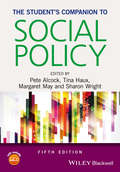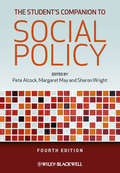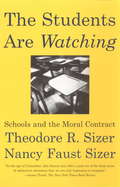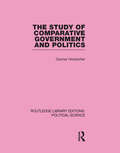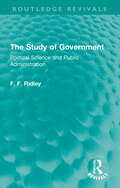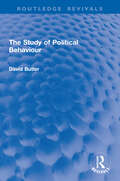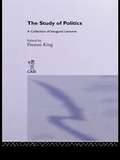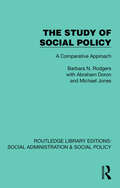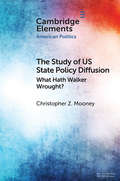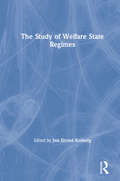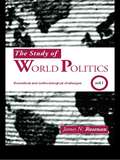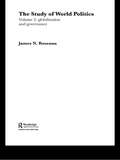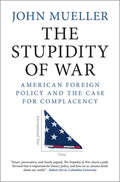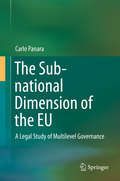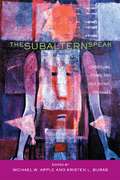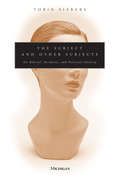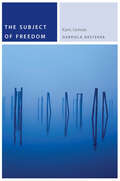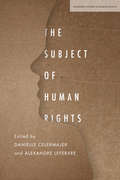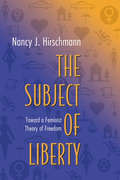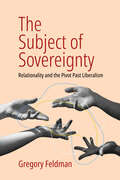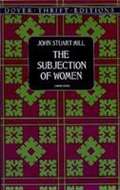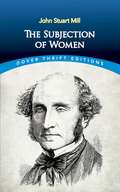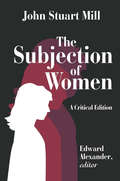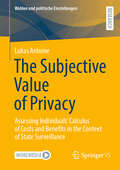- Table View
- List View
The Student's Companion to Social Policy
by Margaret May Pete Alcock Sharon Wright Tina HauxThis fully updated and expanded edition of the bestselling Student’s Companion to Social Policy charts the latest developments, research, challenges, and controversies in the field in a concise, authoritative format. Provides students with the analytical base from which to investigate and evaluate key concepts, perspectives, policies, and outcomes at national and international levels Features a new section on devolution and social policy in the UK; enhanced discussion of international and comparative issues; and new coverage of ‘nudge’-based policies, austerity politics, sustainable welfare, working age conditionality, social movements, policy learning and transfer, and social policy in the BRIC countries Offers essential information for anyone studying social policy, from undergraduates on introductory courses to those pursuing postgraduate or professional programmes Accompanied by updated online resources to support independent learning and skill development with chapter overviews, study questions, guides to key sources and career opportunities, a key term glossary, and more Written by a team of experts working at the forefront of social policy
The Student's Companion to Social Policy
by Margaret May Pete Alcock Sharon WrightThe fourth edition of The Student's Companion to Social Policy maintains the text's inimitable and best-selling approach. Written by a wide range of experts in the field, it has been extensively updated and revised to take account of recent developments and debates and changing political and economic configurations. Includes an additional five chapter section on the key themes and issues in the development of social policy in the UK since the nineteenth century New to this edition are chapters addressing emergent areas in the discipline, new illustrative material, problem-centred review questions, and a dedicated website Provides students with a ‘Companion' which is so comprehensive that it can be used throughout their undergraduate and/or postgraduate studies Meets the needs both of those specializing in social policy or policy-related occupations and the wide range of students studying it as part of other programmes Enhanced by a website available at www.wiley.com/go/alcock4e, featuring student resources including chapter overviews, study questions, videos, resource guides, and more
The Students are Watching
by Nancy Faust Sizer Theodore SizerIn this groundbreaking book, Theodore and Nancy Sizer insist that students learn not just from their classes but from their school's routines and rituals, especially about matters of character. They convince us once again of what we may have forgotten: that we need to create schools that constantly demonstrate a belief in their students.
The Students are Watching: Schools and the Moral Contract
by Nancy Faust Sizer Theodore SizerIn this groundbreaking book, Theodore and Nancy Sizer insist that students learn not just from their classes but from their school's routines and rituals, especially about matters of character. They convince us once again of what we may have forgotten: that we need to create schools that constantly demonstrate a belief in their students.
The Study of Comparative Government and Politics (Routledge Library Editions: Political Science #10)
by Gunnar HeckscherOriginally published in 1957, the first part of the book discusses the general problems of approach, classification, typology and terminology, and examines ancillary fields of study and the methods of teaching comparative government. Part Two is concerned with studies of particular areas, democratic control of foreign policy, political parties, contemporary revolutionary movements, parliamentary procedures, electoral systems and elections, and nationalized industries.
The Study of Government: Political Science and Public Administration (Routledge Revivals)
by F. F. RidleyOriginally published in 1975, this book advocates a certain approach to the study of government: the focus should be institutional, the method comparative and the level practical. The book divides into 2 sections on political science and public administration but the themes are common, as is much of the subject matter. Chapters on the institutional and comparative approach are intended to show how political institutions are often designed to reflect political theories, how institutional engineering may take place and how lessons for domestic reform may be learnt from foreign experience. The second section looks at the state of public administration studies in Britain, the nature of the subject, drawing on the work of earlier theorists, the role of the universities and the civic contribution such study can make
The Study of Political Behaviour (Routledge Revivals)
by David ButlerThe Study of Political Behaviour (1958) shows the lines along which political research has developed, both in Britain and in other countries. It looks at ways of studying voter preferences and choice, party allegiance, analyst expertise and polling accuracy.
The Study of Politics: A Collection of Inaugural Lectures
by Preston KingThis title available in eBook format. Click here for more information.Visit our eBookstore at: www.ebookstore.tandf.co.uk.
The Study of Social Policy: A Comparative Approach (Routledge Library Editions: Social Administration & Social Policy)
by Barbara RodgersOriginally published in 1979, this book enabled students and practising professionals who wished to deepen their understanding of their subject by using a comparative approach. The book begins with a stringent treatment of methodological problems, moves on to suggest how they can be tackled, and sets up a conceptual and analytical framework for the four case studies, and the comparative analysis arising out of them. These case studies, from Britain, France, Israel and Australia are deliberately focused on the personal social services and social work – although these are necessarily set within the political, economic and social context and related to other areas of social provision in each country.
The Study of US State Policy Diffusion: What Hath Walker Wrought? (Elements in American Politics)
by Christopher Z. MooneyIn 1969, political scientist Jack Walker published 'The Diffusion of Innovations among the American States' in the American Political Science Review. 'Walker 1969' has since become a cornerstone of political science, packed with ideas, conjectures, and suggestions that spawned multiple lines of research in multiple fields. In good Kuhnian fashion, Walker 1969 is important less for the answers it provides than for the questions it raises, inspiring generations of political scientists to use the political, institutional, and policy differences among the states to understand policymaking better. Walker 1969 is the rock on which the modern subfield of state politics scholarship was built, in addition to inspiring copious research into federalism, comparative politics, and international relations. This Element documents the deep and extensive impact of Walker 1969 on the study of policymaking in the US states. In the process, it organizes and analyzes that literature, demonstrating its progress and promise.
The Study of Welfare State Regimes
by Jon Eivind KolbergExamines the interaction between labour markets and the welfare state at the institutional level. Topics discussed include the legislative structuring of programmes, how the characteristics of programmes have changed over time, and the private and public mix of programmes.
The Study of World Politics: Volume 1: Theoretical and Methodological Challenges
by James N. RosenauThe Study of World Politics is two volume set that presents thirty-nine essays of some two hundred essays authored by Professor James Rosenau, a renowned international political theorist. They include both articles recently published and those that have not previously been published. All of them focus on the theme of the study of world politics, with the twenty-three articles in this volume devoted to probing theoretical and methodological challenges. This volume is divided into five parts and address such issues as: the challenge of world politics the professional political scientist methods concepts and theories the analysis of foreign policy. Included in this collection is perhaps James Rosenau’s most widely-read essay, ‘Pre-Theories and Theories of Foreign Policy’ as well as several essays that articulate various dimensions of global governance and how they are shaped by the dynamics of globalization. These articles are marked by unique and imaginative formulations which break with a number of conventional approaches employed in the fields of international relations and foreign policy. The Study of World Politics provides the reader with access for the first time to a collection of James Rosenau’s outstanding scholarship, making this an invaluable book to students and academics with interests in politics.
The Study of World Politics: Volume 2: Globalization and Governance
by James N. RosenauJames Rosenau’s work is known for its originality and clarity and the sixteen articles in this new volume are no exception. Tackling the specific challenges posed by globalization and governance, this book covers four key areas: the challenge – tensions, contradictions, outcomes and global affairs the profession – community, globalized space and international relations globalization – complexities, contradictions and theory governance – understanding and future The Study of World Politics presents the thinking of one of the most innovative scholars in the last half century. The subjects addressed provide the big picture, whilst also being meticulous in detail. This new book gives the reader an unparalleled understanding of globalization and governance and is an invaluable tool to students and scholars of politics and world affairs alike.
The Stupidity of War: American Foreign Policy and the Case for Complacency
by John MuellerIt could be said that American foreign policy since 1945 has been one long miscue; most international threats - including during the Cold War - have been substantially exaggerated. The result has been agony and bloviation, unnecessary and costly military interventions that have mostly failed. A policy of complacency and appeasement likely would have worked better. In this highly readable book, John Mueller argues with wisdom and wit rather than ideology and hyperbole that aversion to international war has had considerable consequences. There has seldom been significant danger of major war. Nuclear weapons, international institutions, and America's super power role have been substantially irrelevant; post-Cold War policy has been animated more by vast proclamation and half-vast execution than by the appeals of liberal hegemony; and post-9/11 concerns about international terrorism and nuclear proliferation have been overwrought and often destructive. Meanwhile, threats from Russia, China, Iran, and North Korea, or from cyber technology are limited and manageable. Unlikely to charm Washington, Mueller explains how, when international war is in decline, complacency and appeasement become viable diplomatic devices and a large military is scarcely required.
The Sub-national Dimension of the EU
by Carlo PanaraThis book is the first monograph-form legal study on multilevel governance in the EU and represents a radical change in the approach to this topic. Particularly after the Treaty of Lisbon's entry into force, research on multilevel governance can no longer remain confined to the analysis of political dynamics or of soft law arrangements. Multilevel governance emerges as a constitutional principle in the European constitutional space, envisaging a method of governance based on the strong involvement of sub-national authorities in the creation and implementation of EU law and policy. Its foundation is in the mosaic resulting from the constitutional systems of the Union and its Member States. Multilevel governance arrangements play a fundamental part in achieving key Treaty objectives (such as subsidiarity, respect for the national identities of the Member States including regional and local self-government, openness, and closeness to the citizen). These arrangements lend legitimacy to EU decision-making, while also promoting constitutionalism and democracy in the EU.
The Subaltern Speak: Curriculum, Power, and Educational Struggles
by Michael W. Apple Kristen L. BurasThe question of whose perspective, experience and history is privileged in educational institutions has shaped curriculum debates for decades. In this insightful collection, Michael W. Apple and Kristen L. Buras interrogate the notion that some knowledge is worth more than others. The Subaltern Speak combines an analysis of the ways in which various forms of power now operate, with a specific focus on spaces in which subaltern groups act to reassert their own perceived identities, cultures and histories.
The Subject and Other Subjects: On Ethical, Aesthetic, and Political Identity
by Tobin SiebersThe Subject and Other Subjectstheorizes the differences among ethical, aesthetic, and political conceptions of identity. When a person is called beautiful, why does it strike us as an objectification? Is a person whom we consider to be an exemplary person still a person, and not an example? Can one person conceive what it means to have the perspective of a community? This study treats these thorny issues in the context of recent debates in cultural studies, feminism, literary criticism, narrative theory, and moral philosophy concerning the nature and directions of multiculturalism, post-modernity, and sexual politics. Tobin Siebers raises a series of questions that "cross the wires" among ethical, aesthetic, and political definitions of the self, at once exposing our basic assumptions about these definitions and beginning the work of reconceiving them. The Subject and Other Subjectswill broaden our ideas about the strange interplay between subjects and objects (and other subjects!) that characterizes modern identity, and so provoke lively debate among anthropologists, art historians, literary theorists, philosophers, and others concerned with how the question of the subject becomes entangled with ethics, aesthetics, and politics. As Siebers argues, the subject is in fact a tangled network of subjectivities, a matrix of identities inconceivable outside of symbols and stories. Tobin Siebers is Professor of English at the University of Michigan, and author ofCold War Criticism and the Politics of Skepticism; Morals and Stories; The Ethics of Criticism; The Romantic Fantastic; andThe Mirror of Medusa.
The Subject of Freedom: Kant, Levinas (Commonalities)
by Gabriela BasterraIs freedom our most essential belonging, the intimate source of self-mastery, an inalienable right? Or is it something foreign, an other that constitutes subjectivity, a challenge to our notion of autonomy? To Basterra, the subjectivity we call free embodies a relationship with an irreducible otherness that at once exceeds it and animates its core.Tracing Kant’s concept of freedom from the Critique of Pure Reason to his practical works, Basterra elaborates his most revolutionary insights by setting them in dialogue with Levinas’s Otherwise than Being. Levinas’s text, she argues, offers a deep critique of Kant that follows the impulse of his thinking to its most promising consequences. The complex concepts of freedom, autonomy, and subjectivity that emerge from this dialogue have the potential to energize today’s ethical and political thinking.
The Subject of Human Rights (Stanford Studies in Human Rights)
by Danielle Celermajer and Alexandre LefebvreThe Subject of Human Rights is the first book to systematically address the "human" part of "human rights." Drawing on the finest thinking in political theory, cultural studies, history, law, anthropology, and literary studies, this volume examines how human rights—as discourse, law, and practice—shape how we understand humanity and human beings. It asks how the humanness that the human rights idea seeks to protect and promote is experienced. The essays in this volume consider how human rights norms and practices affect the way we relate to ourselves, to other people, and to the nonhuman world. They investigate what kinds of institutions and actors are subjected to human rights and are charged with respecting their demands and realizing their aspirations. And they explore how human rights shape and even create the very subjects they seek to protect. Through critical reflection on these issues, The Subject of Human Rights suggests ways in which we might reimagine the relationship between human rights and subjectivity with a view to benefiting human rights and subjects alike.
The Subject of Liberty: Toward a Feminist Theory of Freedom
by Nancy J. HirschmannThis book reconsiders the dominant Western understandings of freedom through the lens of women's real-life experiences of domestic violence, welfare, and Islamic veiling. Nancy Hirschmann argues that the typical approach to freedom found in political philosophy severely reduces the concept's complexity, which is more fully revealed by taking such practical issues into account. Hirschmann begins by arguing that the dominant Western understanding of freedom does not provide a conceptual vocabulary for accurately characterizing women's experiences. Often, free choice is assumed when women are in fact coerced--as when a battered woman who stays with her abuser out of fear or economic necessity is said to make this choice because it must not be so bad--and coercion is assumed when free choices are made--such as when Westerners assume that all veiled women are oppressed, even though many Islamic women view veiling as an important symbol of cultural identity. Understanding the contexts in which choices arise and are made is central to understanding that freedom is socially constructed through systems of power such as patriarchy, capitalism, and race privilege. Social norms, practices, and language set the conditions within which choices are made, determine what options are available, and shape our individual subjectivity, desires, and self-understandings. Attending to the ways in which contexts construct us as "subjects" of liberty, Hirschmann argues, provides a firmer empirical and theoretical footing for understanding what freedom means and entails politically, intellectually, and socially.
The Subject of Sovereignty: Relationality and the Pivot Past Liberalism
by Gregory FeldmanSeeking new forms of democracy, progressive politics raises a fundamental question: what is the alternative to the allegedly coherent, self-contained liberal subject that represents the project of modernity? Exploring the themes of nature, race, and the divine, this book identifies the more realistic alternative in the “relational subject”: a subject that is inseparable from the global field of relations through which it emerges and yet distinct from that field because it lives a life that no one else ever has. Recognizing ourselves as such subjects allows us not only to rethink politics, but, more profoundly, to envision sovereignty as the means by which we each rejuvenate ourselves and the polities we constitute with others.
The Subjection of Women
by John Stuart MillThe philosopher argues for equality in legal, political, social and domestic relations between men and women. Carefully reasoned and clearly expressed with logic and consistency, the work remains a landmark in the important struggle for human rights.
The Subjection of Women (Dover Thrift Editions Ser.)
by John Stuart MillThe renowned and influential essay by the great English philosopher argues for equality in all legal, political, social and domestic relations between men and women. Carefully reasoned and clearly expressed with great logic and consistency, the work remains today a landmark in the important struggle for human rights.
The Subjection of Women: Original Edition Of 1911 (Barnes And Noble Library Of Essential Reading Ser.)
by John Stuart MillThe Subjection of Women, which Mill wrote in 1861 but did not publish until 1869, is one of the seminal texts of feminism and aroused more antagonism than anything Mill ever wrote. Conservatives predicted it would do to the English family what socialism would do to England's economy. Liberals believed that women would vote conservative. Many prominent Englishwomen, such as Charlotte Brontë, Elizabeth Barrett Browning, Christina Rossetti, and George Eliot, opposed women's suffrage. Even such advanced thinkers as Sigmund Freud were hostile to the book.In The Subjection of Women Mill argues with lucidity, force and more than usual metaphorical eloquence that "the principle which regulates the existing social relations between the two sexes-the legal subordination of one sex to the other-is wrong in itself, and now one of the chief hindrances to human improvement; and that it ought to be replaced by a principle of perfect equality..." Mill does battle on two fronts, that of intrinsic justice and that of utility. He sees the subjection of women as not only inherently wrong, but intertwined with all the evils of existing society. In support of his central principle, Mill argues that there is no basis in nature for the inferior status of women. He likens the position of the Victorian wife to that of a domestic slave and discourses on the debasing nature of all master-slave relations. He provides historical evidence of what women are capable of achieving and he speculates upon the benefits that will accrue to society as well as individuals from female emancipation, most especially from equality in marriage, which Mill describes as the only remaining legal form of slavery.This new critical edition shows that Mill's classic work has lost none of its relevance. The cross-disciplinary approach of the book can be useful in literature, history, or sociology courses as well as womens studies.
The Subjective Value of Privacy: Assessing Individuals’ Calculus of Costs and Benefits in the Context of State Surveillance (Wahlen und politische Einstellungen)
by Lukas AntoineThis book critically examines the subjective value of privacy in the context of state surveillance, exploring how individuals assess costs and benefits of surveillance. It delves into the complex relationship between attitudes towards privacy, security, and state surveillance and challenges the conventional privacy versus security trade-off through three empirical studies. The first study finds that security justifications for surveillance indeed influence public support for surveillance, particularly in liberal democracies. The second study reveals how financial costs and personal convenience influence support for surveillance. The third study suggests that privacy attitudes may be a stable personality trait, influencing decisions across various contexts. By employing cross-comparative analysis and experimental designs, this book enhances our understanding of privacy's subjective value, refines theoretical frameworks, and offers insights into individual decision-making about privacy. By highlighting the dynamic nature of privacy preferences, this work reveals limitations of simplistic theoretical models and sets the stage for future research in the privacy-security nexus.
